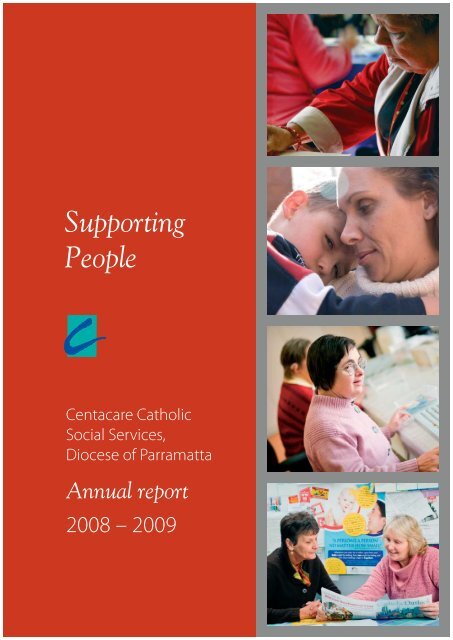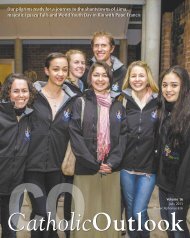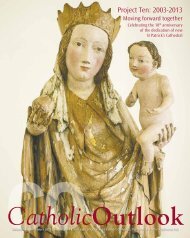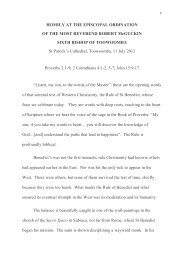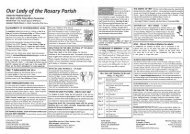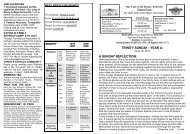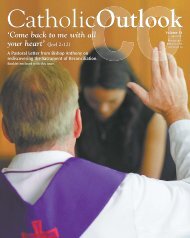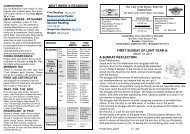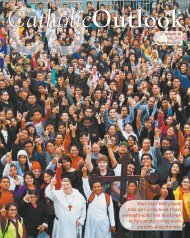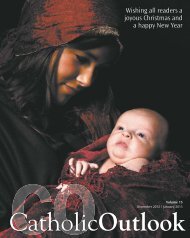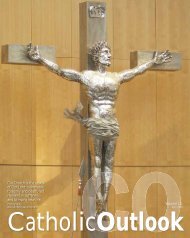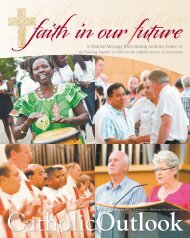2008 â 2009 - Catholic Diocese of Parramatta
2008 â 2009 - Catholic Diocese of Parramatta
2008 â 2009 - Catholic Diocese of Parramatta
- No tags were found...
You also want an ePaper? Increase the reach of your titles
YUMPU automatically turns print PDFs into web optimized ePapers that Google loves.
SupportingPeopleCentacare <strong>Catholic</strong>Social Services,<strong>Diocese</strong> <strong>of</strong> <strong>Parramatta</strong>Annual report<strong>2008</strong> – <strong>2009</strong>
Annual report <strong>2008</strong> – <strong>2009</strong>IndexFrom The Bishop ...........................................................................................................................................................................................2From The Executive Director .................................................................................................................................................................2Supporting Australia’s First Nation People ...............................................................................................................................3-4Supporting Families ...............................................................................................................................................................................5-9Supporting Frail, Aged and Disabled People ....................................................................................................................10-12Supporting Young Mothers and Babies ...............................................................................................................................13-14Supporting Newly Arrived People ..................................................................................................................................................15Supporting Communities ....................................................................................................................................................................16Management Team ..................................................................................................................................................................................17Council Members ...............................................................................................................................................................................18-19Consolidated Financial Statements for Centacare <strong>Catholic</strong> Social Services .........................................................201
Centacare <strong>Catholic</strong> Social Services – <strong>Diocese</strong> <strong>of</strong> <strong>Parramatta</strong>From The BishopThis letter introduces Centacare<strong>Catholic</strong> Social Services –<strong>Diocese</strong><strong>of</strong> <strong>Parramatta</strong> (CCSS) whichembraces the social services work <strong>of</strong>the <strong>Diocese</strong> <strong>of</strong> <strong>Parramatta</strong>, directed tothose who are poor, underprivilegedor marginalized in society, as well as tothose who have become overburdenedby life’s challenges.This Annual Report (the first forCCSS) gives an insight into the workcarried out by a team <strong>of</strong> dedicatedstaff and volunteers in the name <strong>of</strong>the Church. They seek to spread thegospel message <strong>of</strong> hope and to be theface <strong>of</strong> Christ to those in need, throughpersonal contact, example, influence,advocacy, projects and activities.As a channel <strong>of</strong> Christ’sunconditional love and liberatingpresence in our community CCSSbrings to life the call <strong>of</strong> SacredScripture “to act justly, to lovetenderly and to walk humbly with ourGod” (Micah 6:8). This is reflectedin the Mission, Vision, and Values <strong>of</strong>CCSS, and also in the very practicalway CCSS delivers a wide range <strong>of</strong>program and services. These programsand services are funded in partnershipwith Government, the <strong>Diocese</strong>, andother philanthropic interests.I extend my deepest appreciation tothe staff and volunteers <strong>of</strong> Centacare<strong>Catholic</strong> Social Services and commendthis report to you.Bishop Kevin ManningBishop <strong>of</strong> <strong>Parramatta</strong>Chairman <strong>of</strong> the <strong>Catholic</strong>Social Services Council(<strong>Diocese</strong> <strong>of</strong> <strong>Parramatta</strong>)From The Executive DirectorCentacare <strong>Catholic</strong> SocialServices (CCSS) has a richhistory. On one hand it extendsfrom the 1940s when the Archdiocese<strong>of</strong> Sydney was geographically muchlarger and included our own <strong>Diocese</strong><strong>of</strong> <strong>Parramatta</strong>. On the other hand,CCSS is a new agency just 2 yearsold – formed by bringing togethera number <strong>of</strong> agencies, services andministries funded or partly funded bythe <strong>Diocese</strong>.It is not easy to build a new agencyby combining a number <strong>of</strong> existingagencies. The different cultures,strategic directions, policies andprocedures and expectations need tobe homogenized into a single entitywhile not adversely impacting onthose people who are being supported.The impact on staff, especially atthe management levels, has beensignifi cant as we work to establisha new team and bring together thebest each agency and ministry hasto <strong>of</strong>fer. This has also been a time <strong>of</strong>understanding the linkages and thestrengths created by combining thevarious social service or welfare works<strong>of</strong> the <strong>Diocese</strong>.In all these aspects the staff <strong>of</strong> CCSS,and especially the management team,have risen to the challenge.I am proud to be part <strong>of</strong> this agency<strong>of</strong> the Church. In my short time here Ihave come to appreciate the depth <strong>of</strong>knowledge and understanding <strong>of</strong> staffat all levels <strong>of</strong> the mission <strong>of</strong> CCSS.Our <strong>Catholic</strong> heritage and roots givesCCSS a unique role among WesternSydney’s social service agencies.This Annual Report will giveyou an overview <strong>of</strong> the work wedo, though it cannot adequatelyportray the full array <strong>of</strong> programs weprovide to the community on behalf<strong>of</strong> the <strong>Diocese</strong> <strong>of</strong> <strong>Parramatta</strong> and inresponse to the gospel message.I want to thank all the staff <strong>of</strong> theagency and in particular the members<strong>of</strong> the Management Team who haveprovided me with great advice andhave welcomed me as part <strong>of</strong> theirteam. My appreciation also goes toJohn Spillane and to Bishop Manningfor their support and encouragement.Otto Henfl ingExecutive Director2
Annual report <strong>2008</strong> – <strong>2009</strong>Supporting Australia’sFirst Nation PeopleAboriginal <strong>Catholic</strong> Social Services (ACSS) wasestablished in 1986 as a specific program <strong>of</strong> the<strong>Diocese</strong> <strong>of</strong> <strong>Parramatta</strong>.The current committee comprises nine Aboriginalmembers: Janice Kennedy, Janice Brown, Daisy Barker,Jenny Ebsworth, Judy Curry, Margaret Farrell, RhondaRandall, Sharon Mumbler and Victoria Warner. Thecommittee is supported by Father Phil Medlin CSsR, theChaplain and Director, as well as Sr Naomi Smith RSJ(Coordinator), Neroli Stratti (Finance Administrator)and Sr Frances Flemming Assistant Coordinator).ACSS serves in an Aboriginal way under the leadershipand decision-making <strong>of</strong> the Aboriginal Committee. Itstrives to assist, nourish and facilitate the sharing andenrichment <strong>of</strong> all Aboriginal people so as to bridge the gapbetween them and the rest <strong>of</strong> the Australian community.The principal objective <strong>of</strong> ACSS is to work withAboriginal people in order to develop a positive, sustainableorganisation, one that is facilitated by Aboriginal peoplefor Aboriginal people.Pr<strong>of</strong>ileAustralia’s largest concentration <strong>of</strong> Aboriginal Peoplesis believed to reside within the <strong>Parramatta</strong> <strong>Diocese</strong>. Thiscovers the area <strong>of</strong> Western Sydney that includes Penrith,Mt Druitt, St Marys and Blacktown.ACSS supports the Aboriginal Peoples in this areathrough various comprehensive programs designed tohelp contribute to their social well-being and attainment<strong>of</strong> self-suffi ciency.Often the existing service sector is unable to connectwith these individuals and/or families due to the lack <strong>of</strong>culturally appropriate service delivery.ACSS members represent five Aboriginal languagegroups and all reside in Western Sydney. They have a verystrong knowledge <strong>of</strong> the community and very extensivecontacts within the Aboriginal community. As a resultthey have the ability to identify where pastoral care andservices are required.Pastoral care and service requirements are coordinatedand delivered by persons qualified in their particularfi eld and respected Aboriginal community elders. Theyare designed to help bridge the gap between Aboriginalpeoples and the rest <strong>of</strong> the Australian community.A team <strong>of</strong> dedicated volunteers, each with experienceand expertise in various fi elds, supports ACSS in itsservice delivery.Progress towards meetinggoals and objectivesDuring the year under review, signifi cant progress wasmade in meeting our principal objective. That is, todevelop a positive, sustainable organisation, facilitatedby Aboriginal people for Aboriginal people. To thisend, members built upon their skills and increasedtheir confidence through their participation in, andcommitment to, training programs which focused on:• Running an organisation• Leadership• Identifying and increasing employment opportunities• Advocacy3
Annual report <strong>2008</strong> – <strong>2009</strong>Supporting FamiliesBlacktown Family SupportThere were 76 families who were provided withservices under the Blacktown Family Support Servicewithin the 12 months <strong>of</strong> <strong>2008</strong>/<strong>2009</strong>.Most parents were from the age group 31-40 andwere either single, separated or widowed. More than 80per cent were occupying rental accommodations, andalmost 60 per cent <strong>of</strong> female clients received Centrelinkbenefi ts and regarded them as the main source <strong>of</strong> theirincome. The issues identifi ed were domestic violence,parent and child relationship breakdown and childprotection issues.The main strategies/interventions implemented inassisting the client families are as followsCounselling/CaseworkThere were 650 face-to-face meetings conductedand the main casework activity involved advocacy onbehalf <strong>of</strong> the client families to obtain their entitlementsfrom government and/or non-government agencies.Other casework activities included provision <strong>of</strong> courtsupport, preparation <strong>of</strong> reports/letters, assisting with thecompletion <strong>of</strong> forms and providing transport.Most <strong>of</strong> the client families were provided with intensivework aimed at assisting them address child protectionissues, by either eliminating or reducing the risk <strong>of</strong> harm.For example, 40 families identifi ed domestic violence astheir main issue at the initial contacts.Overall, the fi ndings from the written client evaluationsshowed positive outcomes in all areas <strong>of</strong> work, withsignifi cant improvement in personal relationships andparenting, increased levels <strong>of</strong> child safety and moreconnections to the families’ local communities.Group WorkTwo information sessions were facilitated. “FamilyLife in Australia versus Family Life in the Philippines”:a group facilitated in response to the request <strong>of</strong> thePhilippine Australian Community Services Inc. and“Safe & Strong Group – Helping Children ThroughSeparation”. Both groups were well attended and theparticipants gave positive feedback.A therapeutic group entitled “Echoes <strong>of</strong> childhoodand Joy <strong>of</strong> Parenting.” was facilitated for six sessions.The participants considered the group to bebenefi cial in refl ecting on their childhood experiencesand how these infl uenced them in their relationshipswith their children.“Triple P” (Positive Parenting Program) for parentswith children below 12 years <strong>of</strong> age. This group waseducational in nature and ran for six face-to-face sessionsand two telephone sessions. The overall clients’ feedbackindicated that the participants acquired new knowledgeand skills in positive parenting.Penrith Family SupportPenrith Family Support Service provides family support,counselling, advocacy and information to families withindependent children aged 0- 16 years. The service isfunded by the NSW Department <strong>of</strong> Community Services(DoCS) and the <strong>Diocese</strong> <strong>of</strong> <strong>Parramatta</strong> and services thePenrith Local Government Area covering 57 suburbs.The service <strong>of</strong>fers in-home or centre-based individual andfamily sessions addressing difficulties with child protection/safety <strong>of</strong> children, parenting, relationships, domestic violence,drug and alcohol use, mental health and social isolation.We also <strong>of</strong>fer group work activities for both adults andchildren and provide an information and referral service.All service delivery is grounded in the principles <strong>of</strong>community development and evidence based practice inpartnerships within Centacare <strong>Catholic</strong> Social Servicesand other external agencies.The parenting education groups that are run with otheragencies including DoCS ‘Brighter Futures’ Programcontribute to outcomes <strong>of</strong>:• Strong parent /child relationships• Improved parenting competence• Improved family resources and capacityincluding in some cases gaining employment• Children being returned in to the care <strong>of</strong> theirparents after being removed by DoCS.During the last year, 145 sessions were delivered to 90families. The families required a range <strong>of</strong> resources andsupport and we are beginning to see more men in ourservice than we have in the past.One family that has returned to the service over severaltimes is a single parent family. The mother, who we willcall her Sarah, returned because <strong>of</strong> the help and assistanceshe received in the past in her times <strong>of</strong> need.Sarah had been sexually abused as a child and not believedby her mother who was in a new relationship at the time.Sarah had a very diffi cult childhood, turned to prostitutionas a teenager and became pregnant to an older man. For awhile things went okay and another daughter came along.Then the relationship went sour when their third child, aboy, died <strong>of</strong> cot death. Another relationship and anotherchild later, Sarah was in the depths <strong>of</strong> despair.Sarah has had challenges in relating to her eldest daughterfor many reasons, including the fear that her daughtercould also suffer sexual abuse. Home and <strong>of</strong>fi ce counsellingsessions with Sarah and her daughter led to an increasedattachment between mother and daughter.5
Centacare <strong>Catholic</strong> Social Services – <strong>Diocese</strong> <strong>of</strong> <strong>Parramatta</strong>Sarah worked on her low self-esteem and lack <strong>of</strong> selfworth. At times it was one step forward and two stepsback, especially when Sarah discovered she was onceagain pregnant. During her pregnancy Sarah becamemore attached to all her children and was able to resolve alot <strong>of</strong> issues with her own mother. She needed support andto be affi rmed in what she was doing was okay.Sarah gave birth to a beautiful baby boy who is nowalmost three. She popped into our <strong>of</strong>fi ce recently to touchbase and let us know she is doing well. She has put a lot<strong>of</strong> things in place to support her children, especially withopen communication.Relationship andFamily CounsellingThe aims <strong>of</strong> the Relationship and Family Counsellingprogram/service are to assist couples, individuals, children andfamilies to develop and maintain safe, supportive, healthy andenriching relationships. This can be as relationships are newlyestablished, ongoing or when there is relationship breakdownor loss due to death or other transition and change.By pr<strong>of</strong>essional counselling we:• Assist couples, families and individuals to make changeswithin their relationships and within themselves sothat the quality <strong>of</strong> their relationships is enhanced.• Assist couples and individuals whose relationshipwith their partner has broken down irrevocably,to end that relationship with minimum trauma tothemselves and any children <strong>of</strong> the relationship.• Assist children (appropriate to their age) whoseparents’ relationships are conflicted or broken downto live in their families in ways which are leastdetrimental to their emotional and general well-being.• Respond appropriately to the needs <strong>of</strong> those<strong>Catholic</strong>s who approach Centacare who, for whateverreason, require and desire a counselling service thatcan take their religious beliefs fully into account.Through counselling our clients work through issues anddiffi culties that may be impacting on their lives and theirfamilies negatively. They learn new skills and strategies tomanage these issues and diffi culties.The pr<strong>of</strong>essional and committed staff <strong>of</strong>fers flexibleand responsive services to the people who approach ouragency for assistance. Some home visits were made whereappropriate. Continuing pr<strong>of</strong>essional development andlearning are an important aspect <strong>of</strong> our services and wealso <strong>of</strong>fer training and clinical placements to social work,psychology and counselling students.Examples <strong>of</strong> the client stories below give insight intothe critically important work done by staff with clients,including suicide prevention and restoration <strong>of</strong> childrento families. The services has undergone an externalquality audit for accreditation against standards andachieved full compliance.A Dad sought counselling because he was aware thathe was <strong>of</strong>ten angry with his three young children andthis was impacting on his relationship with them andleading to increased confl ict with his wife. Counsellingassisted this Dad to sort through his expectations <strong>of</strong>himself as a father and in turn his <strong>of</strong>ten unrealisticexpectations <strong>of</strong> his children. He reviewed his manner <strong>of</strong>communicating with his children and he realised he had“too many rules”. This in turn led him to review hiswork and family balance. This Dad learnt a lot abouthimself during the counselling sessions and also aboutthe needs <strong>of</strong> his children. He reported a big improvementin his relationship with his children at the end <strong>of</strong> the sixcounselling sessions. He now looks forward to cominghome from work – most <strong>of</strong> the time!A woman was referred for counselling after confl ict inher relationship with her husband escalated to violence.Her husband had been physically violent to her and thepolice had been called. Counselling assisted the womanto consider her safety and the safety <strong>of</strong> her children. Thecounsellor helped her develop a safety plan while sheremained in the relationship living with her husband. Thiswoman’s cultural background made it diffi cult for herto leave this violent relationship. Counselling howeverassisted her to reject the violent behaviour <strong>of</strong> her husbandand use community supports and the resource <strong>of</strong> the policeand courts to increase her safety and that <strong>of</strong> her children.A couple who had been married for 40 years soughtcounselling because in retirement they were arguing aboutmany things in their time together. This was keepingthem apart emotionally at a time when they were lookingforward to a more peaceful life. With they counsellor theyworked out what the issues were and worked on betterways to communicate with each other and learnt how to“fi ght fair” so that neither was left feeling resentful andmisunderstood. They recently celebrated another weddinganniversary and sent a “thank you” card to the counsellorfor helping them renew their marriage.Relationship EducationThe Relationship Education Program/Service aims toassist couples and individuals to prepare for relationships,enhance relationships and work through relationshipbreakdown and separation. Groups and courses are runfor engaged couples, adults, parents and children.This year we have introduced two new group workprograms: “Keeping Kids in Mind”, a course for separatedparents to assist them to focus on the needs <strong>of</strong> theirchildren following the breakdown <strong>of</strong> the adult maritalrelationship; and “Rollercoasters”, a course for childrenaffected by the changes in family relationships eitherthrough separation and divorce or death.Forty Pre-Marriage Courses are <strong>of</strong>fered throughout theyear and facilitated by trained married couples. Evenengaged couples very much “in love” have reported theyimproved their relationship skills by attending the premarriagecourses. Marriage and relationship enrichmentcourses also assist couples to gain more from their lovingrelationships. Marriage Sunday held in August, andSupporting Families6
Annual report <strong>2008</strong> – <strong>2009</strong>Supporting Familiespromoted throughout the <strong>Diocese</strong>, <strong>of</strong>fers couples theopportunity to participate in a reflection afternoon withtalks and activities to enrich their marriage relationship.A young couple attended one <strong>of</strong> our weekend pre-marriagecourses and participated in the sessions facilitated by themarried couple leading the courses. The sessions coveredcommunication, family <strong>of</strong> origin, confl ict resolution, thesexual relationship, family planning and the sacrament<strong>of</strong> marriage. Though they had been a little reluctant atfi rst to wholeheartedly participate, they contributed verypositive evaluations at the end <strong>of</strong> the course saying thesharing <strong>of</strong> the experiences <strong>of</strong> the married couple leadingthe group and the information taken in had increased theirawareness <strong>of</strong> each other and given them new skills to workthrough some <strong>of</strong> their differences. They felt more confi dentin their future marriage together.Five children attended a recent Rollercoasters group workprogram and at the end <strong>of</strong> the course, they had a small“party” and were asked to write down whether anythingwas different for them since the had been in this group. One10-year-old girl wrote, “I don’t feel as sad anymore and Ican tell Mum and Dad when I am sad if they start fi ghtingabout me. I think my little sister should come too.”Sole Parent MinistryThis ministry <strong>of</strong>fers counselling and group work foradults affected by separation, divorce or bereavement. Themain focus <strong>of</strong> the work is the grief and loss experiencedby adults who find their emotional lives affected by thedeath <strong>of</strong> a partner or the loss <strong>of</strong> their marriage relationshipthrough separation and divorce.Counselling and support is <strong>of</strong>fered through telephoneand face-to-face sessions. Home visits are made whereappropriate. Group work and courses and informationsessions are <strong>of</strong>fered regularly to meet the needs <strong>of</strong> clients.Some <strong>of</strong> these include:• “Stepping Beyond” a monthly support groupfor those who are separated or divorced• “Recovery workshops” for working throughissues for those who have lost a partnerthrough death, separation or divorce• “Upper Room Gathering” a monthly support groupfor those who have lost a partner through death• “Seasons Workshops” for those affected by loss and grief• Information sessions around Annulment and theMarriage Tribunal <strong>of</strong> the <strong>Catholic</strong> Church.• A quarterly newsletter is sent to over 2,000 peopleto provide information, resources and support.Here are two examples <strong>of</strong> client casesA woman in her sixties sought counselling and support asshe was still deeply affected by the death <strong>of</strong> her husband some2 years ago. Others were telling her she should be “over itby now” or “she should be moving on”. They had beenmarried for 30 years and had developed a very caring andinterdependent relationship. No one seemed to understandthe depth <strong>of</strong> her loss. She found counselling assisted herto work through symptoms her grieving and attending themonthly support group gave her insights into how otherswere managing. She also took away new strategies forassisting her children and grandchildren in their grief.A Dad sought counselling because he was isolated andalone following the breakdown <strong>of</strong> his marriage andseparation from his wife and children. The family hadmigrated fi ve years earlier and he had no family here inAustralia. He was also experiencing great diffi culties inworking through the emotional upheaval <strong>of</strong> the family lawprocesses in establishing regular contact with his children.7
Centacare <strong>Catholic</strong> Social Services – <strong>Diocese</strong> <strong>of</strong> <strong>Parramatta</strong>Counselling and support assisted this man through histime and he now has better contact with his children andattends a monthly support group.After HoursAs its name implies this Blacktown-based programprovides services outside <strong>of</strong> normal working hours,thereby allowing working people to make use <strong>of</strong> servicesthat would otherwise be unavailable.Eighty-two client families were provided with servicesduring <strong>2008</strong>/09.In general, the characteristics <strong>of</strong> the families providedwith the services are as followsThe female and male parents were mostly in the 20 – 39age groups.More than 59 per cent <strong>of</strong> parents were with theirpartners, almost 17 per cent were separated and nearly 11percent were single parents.25.6 per cent <strong>of</strong> the total number <strong>of</strong> clients were selfreferred;21 per cent were referred by other Centacareworkers; 13 per cent referred by schools; 9.5 per centreferred by the Department <strong>of</strong> Community Services andthe other 9.5 per cent were referred by other governmentagencies. The remaining 21 per cent were referred by otherhealth pr<strong>of</strong>essional, friends, family, church personnel, andother non-government agencies.The three most common issues presented at the initialcontacts were domestic violence, relationship breakdownand children’s educational problems. Parenting issueswere common to all 82 families.The two main strategies <strong>of</strong> the service were counsellingand facilitation <strong>of</strong> parent education programs. These wereall run after hours.Counselling/CaseworkA total <strong>of</strong> 642 face-to-face interviews/contacts were made.The After Hours counsellors also performed other caseworkactivities that were considered essential in managingthe family cases. These tasks entailed contacting otherworkers from other agencies, reports to DoC’s Helpline,attendance at the Protective Planning Meetings,advocacy, preparation <strong>of</strong> reports, and completion <strong>of</strong> formsand provision <strong>of</strong> transport as part <strong>of</strong> the case plan.The client feedback was encouraging with 70 per cent <strong>of</strong>respondents saying they has achieved some <strong>of</strong> their goalsthrough the services provided, while 30 per cent achievedall their goals. The clients rated the service overall “verygood” (50 per cent) and “good” (50 per cent).Thirty per cent <strong>of</strong> clients said the safety <strong>of</strong> their childrenwas “greatly improved” and 70 per cent “improving”;Forty per cent said family relationships were “improveda lot” and 30 per cent “improved a little”; Twenty fi veper cent said overall changes to the family situation were“signifi cantly improved” and 75 per cent “improving”.Parent Education Program:The educational parenting groups facilitated withinthis period are as follows:• “Keeping Children Safe”: Onegroup run over six sessions• “Engaging Your Adolescents”: Twogroups <strong>of</strong> four sessions each• “Triple P” (Positive Parenting Program):One group with six face-to-face sessionsand two telephone sessions.• “Parenting Group for African Parents”:One group run over four sessions.Problem Gambling CounsellingThis service provides counselling for individuals andtheir partners, family members or friends affected byproblem gambling. Often the problem gambler is reluctantto attend counselling and their spouse or another familymember may recognise the problem and request assistancefor themselves. Support and strategies for change areworked through with the partner or family member.The aim <strong>of</strong> counselling for the problem gambler is tochange their problem gambling behaviour so that, either byabstinence or control, it is no longer a problem for them orothers. This behavioural change involves gamblers comingto different beliefs about gambling (many problem gamblersare notorious for their irrational beliefs about gambling) aswell as coming to recognise their own personal and uniquetriggers for beginning episodes <strong>of</strong> problem gambling. Thesetriggers may have strong emotional components. If so, thecounsellor will attempt to assist the client to deal with thepersonal issues which give rise to those strong emotions.Because <strong>of</strong> the immediate social and financial effects <strong>of</strong>problem gambling we attempt to assist the client to changethe gambling behaviour. The only exception to this ruleis when the client has a primary psychiatric problem thatneeds immediate psychiatric intervention. However,because other aspects <strong>of</strong> the client’s life can be closelylinked with the gambling problem, we also attempt toaddress problematic aspects <strong>of</strong> the client’s life apart fromgambling as part <strong>of</strong> the relapse prevention strategies.A Saturday support group (which has operated for thepast 20 years) <strong>of</strong>fers ongoing support, education and relapseprevention strategies for problem gamblers and their partners,or other family members affected by problem gambling.Examples <strong>of</strong> client stories, given below, present anidea <strong>of</strong> the benefi cial work done by staff with clients,including suicide prevention and intervention to avoidfi nancial ruin. The service has undergone an externalquality audit for accreditation against standards andachieved full compliance.A man telephoned the service seeking help because he wasdesperate and suicidal. He had lost everything – his marriage,his home, his job, and all his money due to his problem gambling.He was now threatened with eviction from his rented roomand repossession <strong>of</strong> his car and was overwhelmed by his debts.A counsellor saw him immediately and suicide preventionstrategies were put in place. Over the next two weeks intensivework was done with this man to give him support, link himwith a financial counsellor and work through the immediatecrisis. He has abstained from gambling for the past six monthsSupporting Families8
Annual report <strong>2008</strong> – <strong>2009</strong>Supporting Familiesand is managing to make small re-payments on his debts. Hecontinues to receive support from the service.A couple sought counselling as they were both problemgamblers and were in constant conflict about their debts andinability to manage their urge to gamble. The counsellorworked with them on a number <strong>of</strong> levels – initially withtheir financial distress and then their problem gamblingbehaviours. The couple were committed to change, asthey wanted to start a family but knew this was unrealisticwith their gambling and related financial problems. Withindividual therapeutic sessions to work on the underlyingissues that led to their problem gambling, progress was madeover a period <strong>of</strong> months to the point that both were able tosupport each other to abstain from gambling. Their financialposition improved as they paid <strong>of</strong>f debts based on a budget andrepayment schedule worked out with the financial counsellorand creditors. This couple now feel more confident in theirfuture together and about being able to provide stability andsecurity for any children they may have.Hills Community CounsellingThis past year saw the introduction <strong>of</strong> a new serviceto CCSS as a response to community need. The HillsCommunity Counselling Service, specifically providingfi nancial counselling and gambling and family counselling,was a new endeavour for our organisation and has beenwell received by the community as evidenced by thegrowing number <strong>of</strong> referrals to the service since it beganin January <strong>2009</strong>.This service <strong>of</strong>fers a flexible and responsive approach toan identified need in the Hills area for families experiencingrelationship, gambling and fi nancial diffi culties.This service has been available through the generoussupport <strong>of</strong> the Hills Community Charitable Trust andhas been operating for the last six months <strong>of</strong> the <strong>2008</strong>/09fi nancial year. In this time families have appreciated theconvenience <strong>of</strong> the service based in their local area.Below are two examples <strong>of</strong> our case work:The wife <strong>of</strong> a problem gambler sought counselling when shereceived notice in the mail <strong>of</strong> the imminent foreclosure on themortgage <strong>of</strong> their family home. She had not known <strong>of</strong> herhusband’s gambling problem until then. Financial counsellingassisted her firstly to put constructive strategies in place tosave the family home. Counselling assisted her to deal withthe crisis and the grief and the loss <strong>of</strong> trust, financial securityand family unity. Couple counselling has assisted the reestablishment<strong>of</strong> a more positive relationship with her husband,and he is no longer gambling irresponsibly. Negotiations withcreditors to save the family home are still continuing.A couple sought counselling as they were both problemgamblers and were in constant conflict about their debts andinability to manage their urge to gamble. The counsellorworked with them on a number <strong>of</strong> levels – initially withtheir financial distress and then their problem gamblingbehaviours. The couple were committed to change, asthey wanted to start a family but knew this was unrealisticwith their gambling and related financial problems. Withindividual therapeutic sessions to work on the underlyingissues that led to their problem gambling, progress was madeover a period <strong>of</strong> months to the point that both were able tosupport each other to abstain from gambling. Their financialposition improved as they paid <strong>of</strong>f debts based on a budget andrepayment schedule worked out with the financial counsellorand creditors. This couple now feel more confident in theirfuture together and about being able to provide stability andsecurity for any children they may have.At the cheque presentation <strong>of</strong> $100,000 to Centacare <strong>Catholic</strong> Social Services (CCSS) by the Hills Community Trust (HCT) were (from left): AngelaLittleford (former Executive Director, CCSS), Ann O’Brien (Senior Manager, CCSS) John Spillane (Financial Administrator, <strong>Parramatta</strong> <strong>Diocese</strong>),Rowan Cameron (HCT Trustee), Ross Colosimo (Hillside Hotel licensee) and Michael Richardson MP (HCT Trustee). Photo: Dan McAloon.9
Centacare <strong>Catholic</strong> Social Services – <strong>Diocese</strong> <strong>of</strong> <strong>Parramatta</strong>Supporting Frail, Aged andDisabled PeopleCharter and Background:The Emmaus Disabled Persons <strong>Catholic</strong> Services wasfounded in 1982 as a response to the 1981 InternationalYear <strong>of</strong> People with a Disability. The service developedas a ministry for people with Intellectual disabilitiesand for their families within the <strong>Catholic</strong> <strong>Diocese</strong> <strong>of</strong><strong>Parramatta</strong>.Our service <strong>of</strong>fers residential care to 16 adults (EmmausCommunity Members) within four group homes and aDay Support Program, as well providing occasionalsupport and friendship to a wider community <strong>of</strong> peoplewith intellectual disabilities and to their families. Thisservice promotes the inclusion <strong>of</strong> intellectually disabledpeople in their church and social communities.There are four group homes located in Blacktown,Stanhope Gardens and Windsor. The Day SupportProgram is based at St Patrick’s Parish Centre, Blacktown,and the organisational <strong>of</strong>fi ce is also in Blacktown.Throughout the year a number <strong>of</strong> family gatherings andfundraising events and the annual Sports Day and SpringDance are held. These activities are supported with thegrateful assistance <strong>of</strong> about 40 enthusiastic volunteers.We also enjoy a close relationship with the parish <strong>of</strong> StMadeline’s at Kenthurst who donate the proceeds fromtheir annual May Fair to support our community.Staff Education andTraining OpportunitiesA continuing program <strong>of</strong> staff education has beenundertaken during the year consisting <strong>of</strong> four-day trainingsessions for all staff members. This year’s training hasfocused on a new Positive Behaviour Support Policy,Creating Members’ Daily Living Plans, Fire Safety,Manual Handling and Team Work. Additional traininghas also been undertaken by those in coordinationpositions, and for new staff who have required assistancein developing visual and signed communicationstrategies used within the organisation.Ageing and Health Issuesfor Community MembersAs the Emmaus community members’ age, a growingnumber <strong>of</strong> serious health issues are being encountered.These issues are additional to the usual health concerns <strong>of</strong>10
Annual report <strong>2008</strong> – <strong>2009</strong>Supporting Frail, Aged and Disabled Peopleepilepsy, arthritis, allergies, vision, hearing and mobilityconcerns that are frequent factors for intellectuallydisabled people. It appears that this is the beginning <strong>of</strong>a trend towards increasingly health-focused care basedaround the specifi c health needs <strong>of</strong> the group. It isanticipated that these concerns will create the need forus to adapt over time the mode <strong>of</strong> care provided withinsome sectors <strong>of</strong> the service.Healthy Lifestyle Activitiesfor Community MembersThe residential members <strong>of</strong> the Emmaus Communityparticipate in a wide range <strong>of</strong> activities <strong>of</strong> interest tothem, individually and in groups. A strong emphasison health lifestyle has been incorporated into theweekly routines <strong>of</strong> each household, with most peopleparticipating in sporting groups at various stages <strong>of</strong> theyear. This year community members have been involvedin tee ball, netball, tennis, swimming, ten-pin bowlingand athletics. There is also frequent attendance at theBridges and Tuesday Night Club social groups and disconights. The one activity everyone attends is the GoldenStave Music Therapy Group at UWS Nepean. This is themost anticipated night every week. Several performanceshave been given by the group for family gathering events,church celebrations and disability expos.The Riverside MusicalAll Day Support attendees participate in a musicalproduction at the Riverside Theatre in <strong>Parramatta</strong> eachNovember. The production receives great acclaim fromall who attend and is always considered a wonderfulsuccess by all the dancers and actors.Community NightsEvery month the people who live in an Emmaus houseget together at the <strong>of</strong>fi ce for a Community Night thatis typifi ed by fun, sharing and learning ranging acrossinteresting and educational topics.Sometimes we talk about policies such as cohabitatingin a harmonious way, or practising what to do whencrossing roads and what traffi c lights mean. One nightwe laughed a lot about sharing the front seat in thecar so everyone gets a turn. We were also very excitedto receive a visit from the Fire Brigade who refreshedour memories on fi re procedures. Another night theAmbulance Service came and showed us all the thingsinside the ambulance and let us try out the oxygenmasks and blood pressure machines.We also had a visit from Aboriginal artists anddancers called ‘Fulidreamin’. They showed us aboriginaltools, instruments, eating utensils and weapons. We gotto feel all the different things while they explained tous what it was, what it was used for and what it wasmade from. They showed us dances while they playedtraditional instruments. Then we all had a go at makingsome body paint from a special rock and we painted ourarms and faces.Family GatheringsThree times a year we invite our family members andfriends to come and have a fun day with us. We have apicnic lunch and all the community members help toput on a special liturgy story about something that wethink is important. Sometimes we get dressed up andsing or dance. We even give special performances withour Music Therapy teacher. Other times we just like totalk to everyone – we are like a big family because wehave known each other for a long time and our familiesknow each other too. It is good. Sometimes BishopManning comes and joins in the fun.We would like to share Ron and Joe’s Story, below,to illustrate our community’s interconnectedness in thewider community:One morning, about 6.30am a man named Joe walkedthrough the foyer <strong>of</strong> Blacktown Hospital after the birth<strong>of</strong> his baby son. Joe noticed another man approaching.The man had an obvious disability and was accompaniedby a carer. He had been in the emergency departmentovernight following a severe epileptic seizure and was nowon his way home. They walked past each other and wenttheir separate ways. Joe was struck by the likeness <strong>of</strong> thedisabled man to his own family members. His curiositywas aroused. It had been nearly 20 years since he hadseen his older disabled brother Ron. In his family home ithad been taboo to mention his brother’s name so he didn’tknow where he lived. His search began.About 4 months later, Joe called the Emmaus <strong>of</strong>fi ce andsaid he was looking for his brother and had been told thatperhaps he might fi nd him living in our service. He told11
Centacare <strong>Catholic</strong> Social Services – <strong>Diocese</strong> <strong>of</strong> <strong>Parramatta</strong>his story and gave his brother’s name. Emmaus did indeedhave a man <strong>of</strong> that name living in one <strong>of</strong> our group homes.The man, Ron, had had no family contact for years.Perhaps, perhaps it might just be a lost link rejoining.After meeting Emmaus staff and putting the two storiestogether it became clear that Joe and our member wereindeed brothers. A few days later Ron met his brotherJoe. After all the years they were quietly curious abouteach other and the lost time. Small steps to rebuilding theirbrotherly relationship began that day. Now Ron and Joemeet regularly. Ron has become part <strong>of</strong> his brother’s familyand has two nephews as well. His brother and his familyhave become part <strong>of</strong> the Emmaus Community – one trulyspecial family.Blacktown Neighbour AidBlacktown Neighbour Aid (BNA) is based at StPatrick’s Parish Centre, Blacktown. The main purpose<strong>of</strong> the BNA service is to assist our clients to remainliving in their home for as long as possible, minimisingthe risk <strong>of</strong> premature institutionalisation. Often thisrequires networking with other services such as Meal onWheels, Blacktown Community Transport, the AgedCare Assistance Team, and Community Nursing.BNA remains the fundamental source for client’smental health by reducing their isolation and increasingtheir social contact, interaction and self worth.During the year <strong>2008</strong>/09 BNA assisted and supported149 clients through the work <strong>of</strong> its 27 volunteers, 4permanent part-time Social Support Workers (SSW),and the service Manager.This service provides social support to clients whoare frail aged, or who are younger with a disability,living within the Blacktown Local Government Area.Currently BNA supports 78 clients.Though the BNA service commenced almost 20 yearsago, up until 2007 it operated solely with its volunteersand one full-time staff member. However the primaryfunding source <strong>of</strong> this service, the NSW Department <strong>of</strong>Aging, Disability and Home Care (DADHC) realisedthat volunteer numbers were depleting and agreed t<strong>of</strong>und BNA to employ Social Support staff.Since the introduction <strong>of</strong> paid staff, BNA no longerhas waiting lists. Clients are supported more quickly andreliably and the whole pr<strong>of</strong>ile <strong>of</strong> the service has beenlifted. We still have and greatly value our volunteers,as our paid staff is mainly to “fill-in” with clientsuntil a suitable volunteer can be assigned to them.Unfortunately, this does not happen as frequently aswe would like, but at least clients are not missing outon the support they need.When the funding was first provided from DADHCto introduce paid staff, it was for a 12-month periodonly, with possible reoccurrence based on successfuloutcomes. However, in <strong>2009</strong> we were informed that thefunding would not only be renewed, but also renewedfor the next 3 years.An example <strong>of</strong> the impact BNA has with our clients,especially now that we have paid staff, is a particularlydifficult client we’ll call Miss D.Miss D was referred to BNA from a CommunityTransport service two years ago. They were preparingto discharge her as their client due to her “arrogant,unappreciative, and demanding nature” and contactedBNA as a last resort.Miss D was accepted as a client, and, based onher requirements during the assessment (she is awheelchair-bound, elderly lady with a range <strong>of</strong> healthissues), assigned two staff to assist her on Wednesdays,providing her a few hours out shopping, c<strong>of</strong>fee/lunch,and general social interaction.Though Miss D was in fact difficult at first, andtook some getting used to, the two staff remainedpr<strong>of</strong>essional and patient with her, which paid <strong>of</strong>f in theend. Before long they all enjoyed being out together,and Miss D eagerly looked forward to her time outwith them.Miss D recently passed away. Though sad, this is alsoa great example <strong>of</strong> how BNA made a significant impactonto a client’s life, and played a key role in allowingher to remain home until the end.Supporting Frail, Aged and Disabled People12
Annual report <strong>2008</strong> – <strong>2009</strong>Supporting Young Mothersand BabiesCatherine VillaThe “Catherine Villa” program has been operating for19 years at Quakers Hill and works proactively duringpregnancy and early childhood to provide young mums(under 25) and their children with appropriate earlyintervention and crisis support services.The service is funded through the generous support<strong>of</strong> the <strong>Catholic</strong> <strong>Diocese</strong> <strong>of</strong> <strong>Parramatta</strong> and by theNSW and Federal governments through the SupportedAccommodation Assistance Program and the CommunityServices Grants Program. Catherine Villa services includeSupported Accommodation, Outreach Family Support,Supported playgroup, Young mums group, Ex-residentSupport and Exit Housing.Across all <strong>of</strong> these services staff <strong>of</strong>fer strengths-based casemanagement and support with pregnancy, parenting, livingskills, personal development, health, baby care, vocationand education, housing and tenancy issues and recreation.The program also aims to strengthen the mother’s network<strong>of</strong> supports including family, friends and community andaims to facilitate the optimal development <strong>of</strong> the infant by• Promoting positive relationships betweenparents, children, the family and community,lowering the risk <strong>of</strong> attachment disorders andlong-term negative consequences. We provideyoung parents and children with appropriateearly intervention and crisis support services.• Modeling and mentoring positive adult relationshipswith parents and children who attend CV programs andto increase their awareness <strong>of</strong> community based services.Supported AccommodationWe provide medium to long-term supportedaccommodation for up to fi ve families at any onetime. This year over 220 homeless mothers and theirchildren were referred to Catherine Villa for supportedaccommodation. Many NSW and interstate referralscome from Health and DoCS with a large representationfrom greater Western Sydney.There has been a significant increase in referrals wherewomen require 24 hour supported accommodation sothat their children may be restored to their care. Wewere able to link many families to other services and wereable to support 15 mothers and their 17 infants in ouraccommodation unit. During their stay, families’ strengthsand needs are identified and they work with staff towardsmeeting those needs and attaining permanent or semisupportedhousing.Exit SupportWe support young families to access Housing that willmeet their future needs and continue to work with them insettling in to their new community. This year we supported 20ex-resident families. We work collaboratively with agenciesproviding semi–supported accommodation to provide theyoung families with a continuum <strong>of</strong> care over several years.The agencies we work with include Anglicare, St Michaels,Bankstown <strong>Catholic</strong>Care, Fusion, NYAS /Willowtree, RedCross, Macarthur project and the YWCA.Exit HouseCatherine Villa has an exit house with AffordableHousing where families may live for up to 18 months.This year we supported two young families transition toindependent living from the exit house.Outreach Family SupportThis year we <strong>of</strong>fered home visiting support to 26families at risk and in crisis in the Blacktown/ Hills localgovernment area. Our family workers operate withinthe S.C.A.R.F. child focused casework model and <strong>of</strong>ferparenting support, advocacy and referral for housing,counseling, brokerage, groups, health, child protection,legal issues, skills development and needs as identified.The Young Mums Tuesday Group and WednesdaySupported Playgroup are a vital pathway to connectyoung mothers• To their peers / breaking down isolationand normalizing experiences• To early childhood health servicesencouraging positive health outcomes• To other community resources / resourcing tomeet their own needs and building resilience.13
Centacare <strong>Catholic</strong> Social Services – <strong>Diocese</strong> <strong>of</strong> <strong>Parramatta</strong>We <strong>of</strong>fered 64 groups this year. At groups we are able toassess and meet needs in an informal environment with“kitchen chat”, formal parent education, connection tocommunity resources and positive role modeling andmentoring <strong>of</strong> parenting, play and developing new skills.This year 54 families attended Tuesday Young MumsGroup and another 43 families attended Wednesdayplaygroup. The families attending Playgroup are fromdiverse cultures including Chinese, Indian, Sri Lankan,Malaysian and the Philippines.Guest speakers at groups this year included staff from“Brighter Futures” discussing what they <strong>of</strong>fer; Speechtherapist promoting speech development and discussingconcerns; Westmead dental clinic discussing dental careand hygiene (and giving out goody bags); Toddler safety anddevelopment; and a Fire Brigade presentation on fire safety.“Kids Play” included Mothers’ Day and Christmas crafts,masks, painting, weather stencils, pasta jewellery, balloontennis, bubble play, water play, threading shapes, playdough,cornflour goop, sand play and making finger puppets.Crafts included jewellery making, canvas painting,dream catchers, Easter and Christmas crafts; scrapbooking;blanket making, pizza and pancake making and folk art.“Kitchen chats” included stress management and antistresskits, family relationships, managing rental increases,pregnancy and labour, Christmas budgeting, teething,tantrums, women’s health, issues with ex-partners,homelessness, behavior management, healthy food for kids,readiness for school, starting solids and recognising sickness.Case Study from aCatherine Villa ‘Mum’I was referred to Catherine Villa from JPET in November2006 for assistance with my impending birth and forparenting skills.During my stay at Catherine Villa I was able to accesssupport in all areas <strong>of</strong> motherhood including bonding withmy baby, routines, nutrition, health care, living skills andbudgeting. Before coming to Catherine Villa I was scared<strong>of</strong> having my baby as I did not have any family supportand was unsure <strong>of</strong> how to care for my baby.While I resided at Catherine Villa there was supportive staffthat were available 24 hours a day and in this time I gainedthe skills and knowledge to confidently care for my baby.Since leaving Catherine Villa in July 2007 I met myhusband and have gone on to have a second child. I stillkeep in contact with women who were also staying at thecentre and also regularly attend the Young Mum’s Groupwhere my children can socialise and I can maintainrelationships with other mothers.Project ElizabethProject Elizabeth is a counselling and support service inrelation to pregnancy and children 0-3 years inclusive.The service provides support for the following issues:• Needing to talk about miscarriage, abortion,having a child fostered or adopted. This applieseven when a pregnancy was some time ago andissues are still arising for the client, affectingtheir day-to-day life and/or their relationships• Women and teenage girls concerned aboutpregnancy issues, including the ability to talkabout the best options for the mother and baby• Support for other people who are anxious about thepregnancy <strong>of</strong> their wife, partner, girlfriend or daughter• Post-natal depression support• Diffi culties being experienced incaring for children 0-3 years.This program is supported by grants from Sydney WestArea Health Service and the <strong>Diocese</strong> <strong>of</strong> <strong>Parramatta</strong> andprovides a home and centre based service in Greater WesternSydney. A telephone support service is also provided.During the last twelve months 220 service sessions wereconducted, as well as group sessions for 27 Families.This is a very rewarding and, at times, distressingprogram to work in, especially if the pregnant mother hashad previous children removed from by DoCS and thereis a chance the newborn child will be removed shortlyafter birth.One doesn’t always know how things work out when acouple come in to have a session to discuss an unwantedpregnancy. At times they have already set down a date for atermination procedure. One such case was Sam and Amy:Amy rang two days before her booked procedure. Amyappears concerned, unsure and quite distressed about whatwas about to happen. After a brief chat she agreed to comein the next morning and was hoping to have her partnercome in as well. Obviously she wanted to talk to him inwhat she was told would be a safe confidential space.She arrived the next day with partner in tow. The air inthe room was almost stifling and very quiet. Amy suddenlyraised her voice and said, “I can’t do this. It’s not whatI want. I am only doing it because it’s what you want!”Surprisingly, Sam replied: “It’s not what I want. I thoughtyou didn’t want this Baby. You said we can’t afford it and weare already in debt because we are going in to business.”After much discussion and a lot <strong>of</strong> tears they both decided tocancel their appointment for the moment to give them bothmore time to think. Financial counselling appointment wasset up for them before they returned the next week and otherreferrals for assistance were also made.They returned the next week with Sam in tears and proudlyshowing an ultrasound picture. “Look, here is my baby. Ihope it is a boy. We know there is a struggle a head but wewill try.”Some months later, our staff member who had been workingwith the couple chanced upon a familiar face at a hospital.It was Sam. He caught the arm <strong>of</strong> our staff member andsaid, “Please come with me and see my son. Amy will beso pleased to see you too.” The joy on the faces <strong>of</strong> Sam andAmy will always remain with our staff member. She feelsshe has been an instrument <strong>of</strong> Christ in helping this child bedelivered to his family.Supporting Young Mothers and Babies14
Annual report <strong>2008</strong> – <strong>2009</strong>Supporting NewlyArrived PeopleSudanese Refugee ProgramThe New Arrivals Program for African CommunitiesProgram was formerly known as the Sudanese RefugeeProgram. Centacare <strong>Catholic</strong> Social Services commencedits management <strong>of</strong> this program during the year. The twoFamily Support Workers employed by this program arethemselves former Sudanese refugees.From January 1 to June 31, <strong>2009</strong>, they provided servicesto 28 client families using casework as a main interventionin addressing social and cultural issues, particularlysettlement. The general characteristics <strong>of</strong> these familiesare as follows• Nearly 67 per cent <strong>of</strong> the female parentsand 43 per cent <strong>of</strong> male parents were fromthe age groups 31 to 40 years old• Twenty female parents and 13 maleparents were born in Sudan• The majority have more than three children• All had settlement and integration issues.Casework was one <strong>of</strong> the two strategies used to supportthese newly arrived families. A total <strong>of</strong> 90 face-to-faceinterviews were conducted and activities performedincluded provision <strong>of</strong> information, transport (as part <strong>of</strong>case plan), advocacy, support and collaborative work.Client feedbackClient feedback to the Family Support Workers showedthat across a range <strong>of</strong> measurements the situations<strong>of</strong> these families had improved through contact withthe service. Seventy-fi ve per cent <strong>of</strong> clients said theirhome situation was “improving”; 78.5 per cent ratedimprovement in their parents/carer capacity; 67.8 percent rated improved family relationships; and 64.2 percent rated “Improved connection to their community”.Unfortunately, immigration issues were not resolved forthe overwhelming majority <strong>of</strong> the clients.Social and Sporting GroupsAnother means <strong>of</strong> helping families was throughorganised group activities. Support groups for Parentswith school age children were conducted, one at StMargaret School in Merrylands and another at SacredHeart School, Mount Druitt.The Sport and Recreation Group for youths and youngadults was created and a soccer team formed with 30members, with ages ranging from teens to adults.A Music and Choir Group for youths and young adults wasformed with 35 participants aged from 14 to 30 years old.“An African Evening” fundraiser was held at the DonMoore Community Centre, Carlingford, with proceedsused to support South Sudan Educates Girls fund forthe building <strong>of</strong> a girls’ school and the Aweill SudaneseSoccer club.Celebration <strong>of</strong> Refugees’ Week under the theme“Freedom from Fear” was held on June 14, <strong>2009</strong>, atToongabbie <strong>Catholic</strong> Church.The African Community Mass is celebrated every Sundayat Saint Anthony’s <strong>Catholic</strong> Church, Toongabbie.15
Centacare <strong>Catholic</strong> Social Services – <strong>Diocese</strong> <strong>of</strong> <strong>Parramatta</strong>Supporting CommunitiesAnimationThe Mt Druitt Community Animation Project is fundedjointly by Centacare <strong>Catholic</strong> Social Services, <strong>Parramatta</strong><strong>Diocese</strong> and UnitingCare. Animation is a communitydevelopment program with a difference. It is anchoredin the <strong>Catholic</strong> social justice tradition and the populareducation, civil rights and community developmentmovements have also infl uenced its development.The project’s role is to create opportunities where peoplecan meet and consider possibilities for community action.Individuals do change through the animation process butthey do so by coming together, sharing stories, supportingone another, and sharing understandings <strong>of</strong> communityand acting together. That is, personal and social changegoes hand-in-hand.The Mt Druitt Community Animation Project hasbeen running for 10 years.Bidwill Residents Action GroupOne <strong>of</strong> the key activities <strong>of</strong> the Animation Project hasbeen support for the Bidwill Residents Action Group(BRAG). BRAG formed in 2004 to address the lack <strong>of</strong>shops in Bidwill, specifically the derelict shopping centrein Bidwill Square that attracted vandalism and featuredprominently in negative stories in the media.Because there were no nearby grocery shops, theynegotiated the sale <strong>of</strong> basic grocery items like bread, milkand nappies with the local hotel.BRAG developed a sport program on Saturday morningsafter they reclaimed Bidwill Reserve from vandals and starteda kid’s holiday program. They volunteered with the KidsClub after school activity and in <strong>2008</strong> took over the running<strong>of</strong> it when the Indigenous Youth worker moved on.The skills and confidence gained in being part <strong>of</strong>BRAG has led many <strong>of</strong> its members in paid work or othercommunity roles.They have definite ideas on what they can and won’t doand have participated in workshops to enhance skills thatenable them to deliver better / safer activities.They are an active group who have served theircommunity well and continue working towards their goal<strong>of</strong> promoting a more positive image <strong>of</strong> their communityThe Animation Project is making a significant contributionto the community, and its participants have a high regard forthe Animation Worker. The Project is achieving outcomesand people are being positively impacted by their part inthe Project. The work is well regarded and seen as vitalto the success <strong>of</strong> a number <strong>of</strong> initiatives. The AnimationWorker does a good job <strong>of</strong> linking with, and drawing on, theresources <strong>of</strong> other organisations in the area. She also does agood job <strong>of</strong> sharing information and has a good knowledge<strong>of</strong> what’s happening and available in the area. She has alsobuilt relationships with local residents and other workers.Testimonial:My name is Kim, I am a 30 year old single mum withtwo sons (10 & 8) & a three year old daughter. I am amember <strong>of</strong> BRAG. I joined BRAG’s sport program as Ihad a hyperactive son and became a committee member ashort while after. A few months later the animation workerencouraged me to take the opportunity to do a coachingcourse through Dept <strong>of</strong> Sport & Recreation. I gained a lot<strong>of</strong> confi dence through being a leader and working with thekids. I wanted to continue working with BRAG kids andhave been able to gain a senior fi rst aid certifi cate twice,so I can help the kids when needed.There was no stopping me after this; I volunteered at mychildren’s school working with the speech therapy programto help kids with speech problems and reading. I continuedto work with the Kids club worker after the sport programstopped and for the last year and a half with BRAG to runthe Kids Club.For three years I was BRAG secretary and this last year vicechair,helping to organise Gala Days, Festival’s, Carol’s in theSquare and Seniors Lunches. I have worked on local issuessuch as the reopening & refurbishment <strong>of</strong> the local shoppingcentre (which has been closed for more than 10 years),negotiations with local hotel to sell basic grocery items likemilk and bread, the closure <strong>of</strong> dangerous laneways, gettinga public phone in Bidwill and the cleaning up <strong>of</strong> the reservebehind the church in Bidwill. I have completed a TAFEOutreach computer course and am now doing an Outreachcourse in Retail (I left school at 14 with low literacy skills).Without the Animation worker and BRAG supporting mewith it all, I wouldn’t be where I am now.Animation Project worker, Lee Healey, left, with Kim16
Annual report <strong>2008</strong> – <strong>2009</strong>Management TeamBack Row, from left: Otto Henfling, Executive Director; Fabian Ferretti, Manager, Blacktown Neighbour Aid; Jeanette Allen-Maritz, EmmausManager; Jeanette Reid, Manager <strong>of</strong> Penrith Family Support and Project Elizabeth; Ann O’Brien, Senior Manager, Counselling and Education.Front Row: Louise Masters, Coordinator, Catherine Villa; Tony Hoban, Business Manager; Remy Matias, Manager Blacktown FamilySupport, After Hours and New Arrivals Program; Cecily Spradbrow, Senior Manager, Disability, Mental Health and Ageing; CathyTracey, Senior Manager, Family and Community Support; Fr Phil Medlin, Senior Manager, Aboriginal and Community Building.17
Centacare <strong>Catholic</strong> Social Services – <strong>Diocese</strong> <strong>of</strong> <strong>Parramatta</strong>Council MembersBishop Kevin Manning (Chair)Bishop Manning leads by example in hiscommitment to social justice and a “fair go” for all.At a recent <strong>Catholic</strong> Commission for EmploymentRelations conference Bishop Manning gave hisperspective on social services: “Central to socialservices is a sense <strong>of</strong> justice, an expectation that allpeople have a right to their dignity, to have theirbasic needs met, to be safe, housed, adequately caredfor and loved. The primary purpose <strong>of</strong> social servicesis to continue the work <strong>of</strong> Christ in acknowledgingthe dignity <strong>of</strong> every person, calling them to be fullyalive and reaching out, in particular, to those whoare poor, underprivileged or marginalised in society,as well as those who have become overburdenedby life’s challenges.” He went on to say: “If weare to give continuity to the mission <strong>of</strong> Christ, ‘Ihave come that they may have life, and have itabundantly’ (John 10:10), then it is imperativethat we provide quality and pr<strong>of</strong>essional servicesthat enable people to recognise and live outtheir potential in life in a true spirit <strong>of</strong> hope”.Pr<strong>of</strong> Trevor ParmenterPr<strong>of</strong> Parmenter’s expertise spans many fi elds, andincludes quality <strong>of</strong> life; transition from school to work;employment; behaviour problems; ageing; familystudies; autism spectrum disorders; policy development;evaluation <strong>of</strong> disability programs; and physical andmental health <strong>of</strong> people with a developmental disability.Pr<strong>of</strong> Parmenter is the Foundation Chair <strong>of</strong> DevelopmentDisabilities at The University <strong>of</strong> Sydney and theDirector <strong>of</strong> the Centre for Development DisabilityStudies at the Royal Rehabilitation Centre Sydney.Absent:Back row, from left, Otto Henfling, Vince Graham, Gary Jacobson.Front row: Bernard Ryall, Sr Libby Rogerson, Bishop Kevin Manning, Mery Carollo and Pr<strong>of</strong> Trevor ParmenterAnnHampshireSr WendyHildebrand IBVMJohnSpillane18
Annual report <strong>2008</strong> – <strong>2009</strong>He is active in a range <strong>of</strong> national and internationaldisability organisations including four years as president<strong>of</strong> the International Association for the Scientifi cStudy <strong>of</strong> Intellectual Disabilities. Pr<strong>of</strong> Parmenter isnoted for his experience in translating research intopractice, especially through the development <strong>of</strong> trainingprograms; supervision <strong>of</strong> research students and strategicplanning consultancies. In 2005 he was awarded theOrder <strong>of</strong> Australia for his contribution to researchand practice in the fi eld <strong>of</strong> intellectual disability.Anne HampshireAnne has 18 years’ experience in the nongovernmentsector, across a range <strong>of</strong> organisations,including community services and advocacyorganisations. Anne currently works at MissionAustralia with a focus on research, public policyand program development. She is the Chair <strong>of</strong>Mission Australia’s Indigenous Working Group.Anne has researched and written on abroad range <strong>of</strong> issues including young people,families and children, social capital, povertyand disadvantage and unemployment.Sr Libby Rogerson IBVMSr Libby is the Co-ordinator <strong>of</strong> Social Justice andDirector <strong>of</strong> Caritas in the <strong>Diocese</strong> <strong>of</strong> <strong>Parramatta</strong>. SrLibby serves on many Boards, including the House<strong>of</strong> Welcome (centre for refugees and asylum seekers),Edmund Rice Community Services and Jesuit SocialServices. In 1999, Sr Libby worked with Caritasin East Timor and was awarded the HumanitarianMedal. Sr Libby is involved in a variety <strong>of</strong> programsand issues including a community developmentprogram in Mt Druitt support for Sudanese refugeesin the Western suburbs, and asylum seekers.Sr Wendy Hildebrand IBVMSr Wendy has 17 years’ experience working inthe welfare sector and has worked with family andyouth programs including residential, counselling,case management, education and training.She was a member <strong>of</strong> the <strong>Parramatta</strong> <strong>Catholic</strong>Commission for Justice and Peace from 1991-93; sheworked at Catherine Villa from 1991-93 and was onthe Catherine Villa Board <strong>of</strong> Management from 1993-2007. She has extensive expertise and experiencein program management and strategic planning.John SpillaneJohn has been the Diocesan Financial Administratorsince September 2000. Previously, he was theGeneral Manager <strong>of</strong> the Diocesan DevelopmentFund. John has a long background in fi nanceand banking together with senior managementexperience in business and pr<strong>of</strong>essional practice.In addition to being a member <strong>of</strong> severalkey committees within the <strong>Diocese</strong> and<strong>Catholic</strong> Education Offi ce, he was previouslythe Chair <strong>of</strong> the Board <strong>of</strong> Catherine Villaand a member <strong>of</strong> the Centacare Board.He has a keen interest in the work <strong>of</strong> the<strong>Diocese</strong> in social welfare and in ensuring thatresources are suffi cient and used correctly inthis important mission <strong>of</strong> the Church.Bernard RyallBernie is the Financial and Administrativeleader for <strong>Catholic</strong> Education in the <strong>Diocese</strong>.Since his appointment in October 2006, he hasled and implemented system-wide reform toimprove fi nancial stewardship, reporting andaccountability in support <strong>of</strong> the mission to improvethe learning outcomes for each student.Prior to his appointment, Bernard held seniorexecutive positions in the fi nancial services sectorand has a history <strong>of</strong> outstanding achievements.Otto HenflingOtto is the Executive Director <strong>of</strong> <strong>Catholic</strong>Social Services and was appointed to thisposition in July <strong>2009</strong>. Previously Otto worked for<strong>Catholic</strong>Care (Sydney <strong>Diocese</strong>) as the Director<strong>of</strong> Employment Training Support Services.Prior to working at <strong>Catholic</strong>Care Otto spent 22years working in the Government sector. Ottois also on the Board <strong>of</strong> Churches CommunityHousing Ltd , a niche provider <strong>of</strong> low cost rentalhousing on behalf <strong>of</strong> the church sector.Mery CarolloMery is a registered psychologist currently workingat <strong>Catholic</strong>Care (Sydney <strong>Diocese</strong>). Mery began asa counsellor and has worked at <strong>Catholic</strong>Care for 11years. Mery headed up the Jobs Services Australiatender that was successful in June <strong>2009</strong>. She iscurrently the Senior Manager for Clinical Services.Vince GrahamVince fi rst started his working career inState owned corporations and followed thatwith some time as the CEO <strong>of</strong> Railcorp, Vinceis currently the CEO <strong>of</strong> Integral Energy.Gary JacobsonGary has worked in the Community Sector all<strong>of</strong> his working life, primarily in disability. Gary iscurrently working for himself following his passion“Social Economy” (how community organisationssustain themselves). Most recently he was the CEO <strong>of</strong>Windgap a inner Sydney provider <strong>of</strong> disability services.19
Centacare <strong>Catholic</strong> Social Services – <strong>Diocese</strong> <strong>of</strong> <strong>Parramatta</strong>Consolidated Financial Statements for Centacare <strong>Catholic</strong> Social ServicesINCOME STATEMENTYear Ended 30 June <strong>2009</strong>REVENUES <strong>2008</strong>-09$ 2007-08$ 2006-07$Grants [Government, Non Diocesan] 3,269,572 3,075,949 2,721,637Grants [<strong>Diocese</strong>] 1,007,581 495,550 507,245Service User Contribution / Board / Consult Fees 346,354 278,353 359,712Fundraising / Donations / Gifts 39,297 16,109 21,347Interest 55,000 55,373 17,104Other 47,274 70,722 63,710Total 4,765,078 3,992,056 3,690,756EXPENSESEmployee Costs [Salaries, Wages, Super etc.] 3,679,962 3,092,013 2,583,645Interest Expense 8,804 11,219 12,578Repairs & Maintenance 32,290 38,713 21,719Utilities [Electricity, Gas etc.] 79,013 68,180 18,612Motor Vehicle Expenses [incl. Travel] 172,856 155,328 127,004Insurance 88,195 141,802 61,923Depreciation 58,187 35,145 100,050Rent 93,548 82,807 159,264Telephone 42,772 38,644 32,119Equipment 31,843 59,586 50,467Office Cost [Printing, Stationery etc.] 52,748 41,752 53,164Other 419,427 364,344 351,356Total 4,759,645 4,129,533 3,571,901NET OPERATING PROFIT 5,433 -137,477 118,855Unaccounted for movement in Equity - Solo Parents Ministry -142Adjusted Net Operating Pr<strong>of</strong>it 5,291BALANCE SHEETCurrent AssetsCash Assets 748,526 722,889 945,943Trade and Other Receivables 56,006 18,316 24,983Other 26,336 15,419 11,087Total 830,868 756,624 982,013Non Current AssetsProperty, Plant & Equipment 772,358 781,904 773,660Total 772,358 781,904 773,660TOTAL ASSETS 1,603,226 1,538,528 1,755,673Current LiabilitiesTrade and Other Payables 211,651 164,742 139,451Short Term Borrowings 37,274 71,401 132,234Provision 263,637 211,344 174,530Other 185,988 163,498 218,622Total 698,550 610,985 664,837Non Current LiabilitiesLong Term Borrowings 52,648 80,806 106,623Total 52,648 80,806 106,623TOTAL LIABILITIES 751,198 691,791 771,460NET ASSETS 852,028 846,737 984,213EQUITYAccumulated Funds 852,028 846,737 984,213Total 852,028 846,737 984,21320
Annual report <strong>2008</strong> – <strong>2009</strong>Centacare <strong>Catholic</strong>Social ServicesHead OfficeExecutive Director – Mr Otto Henfling<strong>Parramatta</strong>: Level 2, 10 Victoria RdTel (02) 9630 7788, Otto.Henfling@ccss.org.auBusiness Manager – Mr Tony Hoban<strong>Parramatta</strong>: Level 2, 10 Victoria RdTel (02) 9630 7788, 0438 987 357,Tony.Hoban@ccss.org.auFamily Counselling & Parenting Educationand Blacktown Family SupportManager – Mrs Remy MatiasBlacktown: St Patrick’s Parish Centre,51-59 Allawah StTel (02) 9671 2011, Remy.Matias@ccss.org.auBlacktown Neighbour AidManager – Mr Fabian FerrettiBlacktown: St Patrick’s Parish Centre,51-59 Allawah StTel (02) 9671 2011, Fabian.Ferretti@ccss.org.auEmmaus Disabled Persons <strong>Catholic</strong> ServicesSenior Manager – Ms Cecily SpradbrowBlacktown: 26 Hereward HwyTel (02) 9831 2826, emmaus@ccss.org.auFamily Support Program – Catherine VillaSenior Manager, Children & Families– Mrs Cathy TraceyQuakers Hill: Catherine Villa, 23 Pentland StTel (02) 9837 2095, Cathy.Tracey@ccss.org.auHills Community CounsellingSenior Manager – Mrs Ann O’BrienBaulkham Hills: St Michael’s Family Centre,522 Windsor RdTel (02) 9630 7788, Ann.OBrien@ccss.org.auHIV/AIDS MinistryContact – Rev Senan Ward OSA<strong>Parramatta</strong>: Level 2, 10 Victoria RdTel 0419 356 040, Senan.Ward@ccssorg.auNew Arrivals ProgramManager – Mrs Remy MatiasBlacktown: St Patrick’s Parish Centre,51-59 Allawah StTel (02) 9671 2011, Remy.Matias@ccss.org.auPenrith Family Support Service andProject ElizabethManager – Mrs Jeanette ReidKingswood: St Joseph’s Parish Rooms,16 Richmond RdTel (02) 4721 5331, Jeanette.Reid@ccss.org.auRelationship and Family CounsellingSenior Manager – Mrs Ann O’Brien<strong>Parramatta</strong>: Centacare, Level 2, 10 Victoria RdTel (02) 9630 7788, Ann.OBrien@ccss.org.auBlacktown: St Patrick’s Parish Centre,51-59 Allawah StTel (02) 9671 2011Relationship Education ProgramSenior Manager – Mrs Ann O’Brien<strong>Parramatta</strong>: Centacare, Level 2, 10 Victoria RdTel (02) 9630 7788, Ann.OBrien@ccss.org.auResponsible Gambling Counselling ServiceSenior Manager – Ann O’BrienBlacktown: St Patrick’s Parish Centre,51-59 Allawah StTel (02) 9671 2011, Ann.OBrien@ccss.org.auSolo Parents’ MinistryCo-ordinator – Sr Eileen Quade RSM<strong>Parramatta</strong>: Level 2, 10 Victoria RdTel (02) 9890 2968, Eileen.Quade@ccss.org.auThe Animation ProjectCommunity Animator – Ms Lee HealeyBidwill: 26 Bidwill SquareTel (02) 9835 1556, 0423 263 411,lee.healey@ccss.org.au21
Centacare <strong>Catholic</strong> Social Services, <strong>Diocese</strong> <strong>of</strong> <strong>Parramatta</strong>10/10 Victoria Rd, <strong>Parramatta</strong> NSW 2150, Australia


